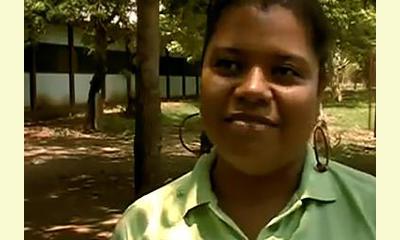|
|
Nicaragua: "Being a teacher is a career that I fell in love with"
un article par Fernando Francia, Communications officer, Latin America Regional Office of Education International (reprinted by permission and abridged)
Video: María Elena Cordonero, teacher
Poverty, needs, and problems cannot diminish teacher María Elena Cordonero’s enthusiasm to keep on sowing the seeds of knowledge in every class she teaches in first grade in the Granada Department of Nicaragua.

click on photo to enlarge
María Elena Cordonero leaves home very early, takes her children to their own school and arrives before seven in the morning at the school where she teaches first year primary school pupils.
Before school begins, she chats with some of the parents about any questions they may have or something that interests them, and tries to begin with songs and games at seven on the dot. “I begin with games so that the children can adapt and are ready to work. Because sometimes they don’t sleep well, they have problems at home or they haven’t eaten. It’s so they can get motivated.”
Economic difficulties have an impact on the children’s education but the teachers’ struggle for quality education always seeks to overcome these difficulties and provide the best for their pupils. “I feel pleased when the children are comfortable. My roof has been leaking and the parents came to do some activities. I was happy when we got the roof sorted out. Because if the children feel good, then I work well,” said María Elena.
For this teacher who strives daily to give an education to dozens of children, “a good quality school is a school that gives the best to its children. “Sometimes, it is not about having infrastructure, having acrylic boards or fans. It’s about having the will, for the teachers, the parents and the administrative staff. And for the government that supports us and asks us as teachers what we need to keep moving forward, what tools we need, what strategies, and gives them to us,” said the teacher.
The Latin America Regional Committee of Education International is in the process of building up a Latin American Pedagogical Movement that aims to take the concept of quality education to the classroom and present as a public policy proposal the trade union vision of all round quality education.
One of the pillars of this Pedagogical Movement for Quality Education is the active participation of teachers in education policy proposals.
In Granada, Nicaragua, María Elena strives every day from the classroom and through her work to achieve quality education. “In the school where I am, there is no cleaning staff, it is us teachers who have to clean the room. In addition to cleaning, I have to break off from teaching in order to provide school meals. In the classroom, I collect the plates the children have brought with them and then I serve them their food. The work of the teacher is not only to teach lessons. There are children who come to school without having eaten breakfast. More than teachers, we are mothers. The children need looking after,” she explains.
For María Elena, it is a labour of love. “It was a career I fell in love with,” she says. . . .
(Thank you to Janet Hudgins, the CPNN reporter for this article.)
|








|
DISCUSSION
Question(s) liée(s) à cet article:
What is the relation between peace and education?,
* * * * *
Commentaire le plus récent:
Letter from Mohatma Gandhi to Maria Montessori.
To Madame Montessori
Even as you, out of your love for children, are endeavoring to teach children, through your numerous institution, the best that can be brought out of them, even so, I hope that it will be possible not only for the children of the wealthy and the well-to-do, but for the children of paupers to receive training of this nature. You have very truly remarked that if we are to reach real peace in this world and if we are to carry on a real war against war, we shall have to begin with children and if they will grow up in their natural innocence, we won't have the struggle, we won't have to pass fruitless idle resolutions, but we shall go from love to love and peace to peace, until at last all the corners of the world are covered with that peace and love for which, consciously or unconsciously, the whole world is hungering.
Mohatma Gandhi, Young India, 19-11-''31

|
|









